What’s GA4? Search me… the new Google Analytics explained
Google is about to shake up the world of search with their new version of Google Analytics. You need to prepare for it, says digital marketing expert Nelly Berova.

From 1 July next year, you’ll need to run a new version of the program – Google Analytics 4 (or GA4). Unsurprisingly, GA4 replaces GA3, also called Universal Analytics. While the move won’t come in for almost a year, you need to be thinking about opening a GA4 account now and adding it to your website alongside GA3 to ensure you have several months of data recorded in the new tool before GA3 stops working.
While it won’t come in for a year, you need to be thinking of opening a GA4 account now.
On the plus side, the move to GA4 will mean lots of benefits for real estate digital marketers. Responding to changes in privacy rules, GA4 has the advantage of being more flexible and better at predicting website user behaviour than the previous incarnation, for stronger insights. For marketers looking to learn from their customers’ behaviour as they move up the conversion funnel, these things make it a more powerful tool.
How is GA4 different to GA3?
Most of the time GA4 will continue doing the same as your existing Google Analytics. You can use it for reporting basic metrics, such as traffic to your website, page hits, where your visitors are coming from and how many people respond to your call to action by submitting a form or making a phone call – all the things estate agents rely on for their everyday marketing analysis.
What is new, however, is the way the two platforms are structured. Put simply, GA3 is a session-based system, which means it collects data based on the timeframe of the user’s interaction with the website. GA4 is an event-based system – this means it is structured around each action a user takes. The benefit of the shift is that it makes GA4 better at analysing and predicting user behaviour.
What other benefits are there?
When you log in to your GA4 home page, you’ll get a quick overview report telling you where your new users come from, which are your top performing campaigns and which pages are getting the highest number of views.
You’ll be able to view real-time reports on events which happened within the past 30 minutes and see a snapshot of single users with information about the device they are using, their location, and their engagement with your site.
There are life cycle reports which examine how users move up the conversion funnel and an analysis hub which allows you to create bespoke reports related to your business. There are also more ways to visualise and represent the data you are reporting on.
Do I need to switch to GA4 now?
Yes, you should start to think about doing so soon. Although there is a while until the switchover if you fail to migrate your business to GA4, there will come a point when data will stop flowing from your website to your Google Analytics 3 account. Even if you feel that GA3 is enough for your needs right now, moving to GA4 will allow the new system to start collecting data, making future analysis more meaningful.
Remember, tracking your customers is essential to measurement. If you can’t measure, you can’t make informed decisions on improving your marketing strategy and boosting your business.
Can I switch to GA4 myself?
Up to a point. Making sure that the GA4 tracking code is added to your website instead of or as well as the GA3 code is quite simple. If you’re not sure how to do it, you’ll find plenty of tutorials online.
However, you also need to make sure you are tracking the right metrics for the reports you wish to obtain. Depending on the level of skill in your agency, this may be where you need to bring in a professional data analyst who is well-up on how GA4 works. Like us at Art Division they may have been learning about the system since it was announced last year and in BETA form, ready to migrate clients across and make GA4 the default system for all new accounts.
To conclude, your analytics are vital to understanding your web traffic and user behaviour. From what we’ve seen of GA4, it should give you better quality data to help you make smarter marketing decisions – but we recommend you act now to make sure you’re all set for the switchover and not in danger of missing the data boat.
Got a question?
Visit www.artdivision.co.uk






